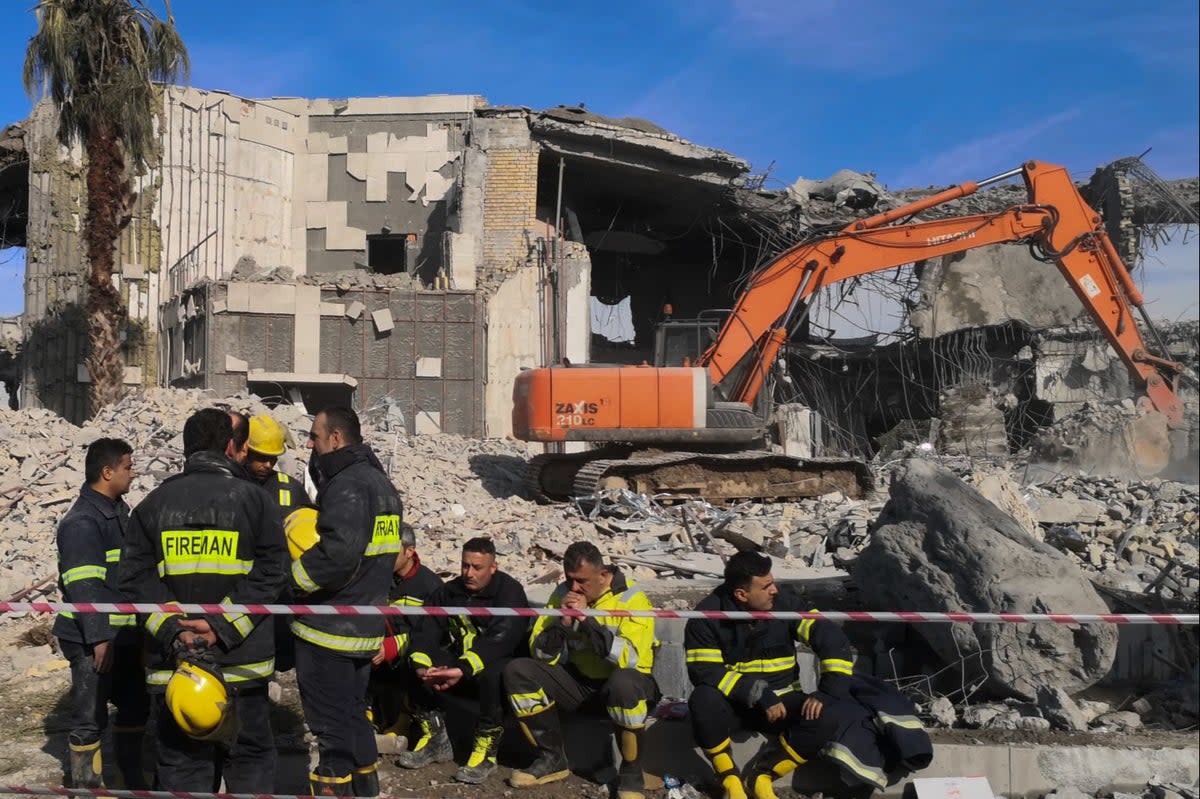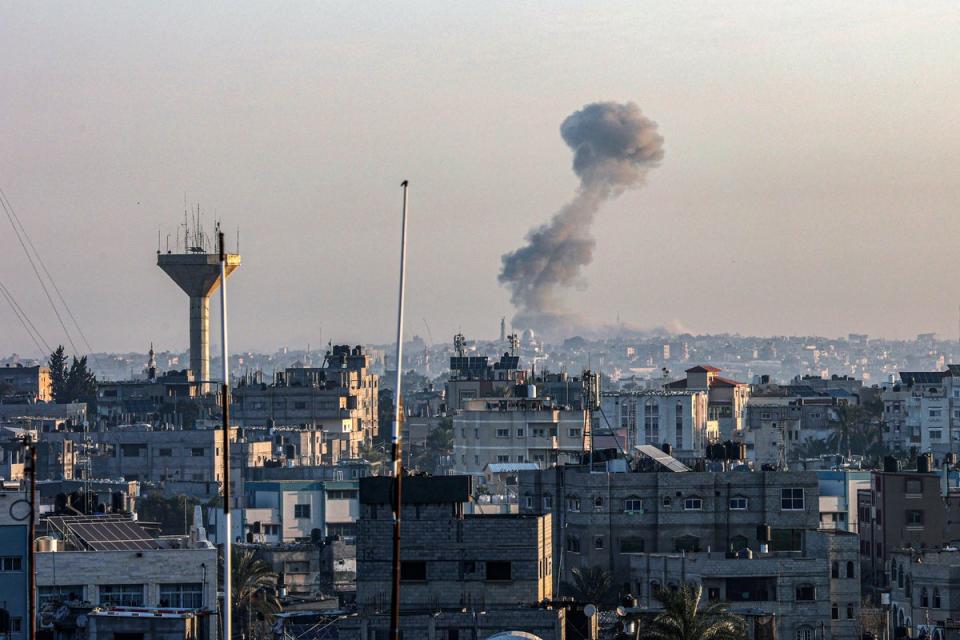Iran claims attack on Israeli ‘spy base’ in Iraq as Middle East turmoil grows

Iraq has vowed to take Iran to the UN Security Council over what Tehran has claimed was an attack on an Israeli “espionage headquarters” in the north of the country – as fears over the spread of conflict across the region in the wake of Israel’s war on Hamas in Gaza continue to grow.
Iran’s Revolutionary Guard Corps (IRGC) said that it had launched ballistic missiles at the semi-autonomous Kurdistan Region where it claimed it hit a complex belonging to Mossad, the Israeli intelligence agency. However, Iraq’s government issued a statement saying the Iranian attack was “a blatant violation” of its sovereignty and “strongly contradicts the principles of good neighbourliness and international law, and threatens the security of the region”. There has been no comment from Israel.
The IRGC also said it had struck in Syria, against Isis, as part of a response to an attack in the Iranian city of Kerman earlier this month that killed more than 80 people. The bombing attack was claimed by an Isis branch based in Afghanistan, but Tehran – hostile to Israel for decades – claimed that Israel had somehow aided the attack, without providing any evidence.
Many nations across the Middle East have been on edge since a Hamas attack inside Israel on 7 October killed 1,200 people and saw over 240 more taken hostage. In response, Israel has vowed to eradicate Hamas and has launched airstrikes and ground operations inside Hamas-controlled Gaza, backed up by a blockade. Health officials in Gaza say more than 24,000 people have been killed in the three-month conflict.
Hamas are backed by Iran, with Tehran also supporting Hezbollah in Lebanon and the Houthis in Yemen. Hezbollah have been engaging in near-daily exchanges of fire with Israeli forces on the Israel-Lebanon border, while the Houthis have been striking ships in the Red Sea, a vital route for global trade. The Houthis claim they are targeting Israel-bound ships, but have struck several US-owed vessels, sparking the creation of a multi-national force in the area, led by Washington, to protect shipping.
The UK and US have also struck a number of Houthi sites across Yemen with missiles to try to deter attacks. The latest strike took place on Tuesday, according to US officials, with four anti-ship ballistic missiles that were being prepared to launch from Houthi-controlled territory struck and destroyed.
European Union member states have also given initial backing to create a naval mission to protect ships in the Red Sea. Diplomats told Reuters the aim was to establish the mission by 19 February at the latest, with it becoming operational quickly afterwards, and that it would work in coordination with partners already in the region.

This has all fed into the threat of wider Middle East conflict, as violence continues to spill across borders.
The United States condemned what State Department spokesperson Matthew Miller described as “Iran’s reckless missile strikes” in Iraq.
The strikes, on a residential area near the US consulate in Kurdistan’s capital Irbil, were condemned by Iraqi Kurdish prime minister Masrour Barzani as a “crime against the Kurdish people” in which at least four civilians were killed and six injured. France accused Iran of violating Iraq’s sovereignty.
Iranian foreign ministry spokesperson Nasser Kanaani said in a statement that the strikes in Iraq and Syria were “in line with the resolute defence of the country’s sovereignty and security, countering terrorism, and part of the Islamic Republic’s punishment against those who threaten the country’s security”.
In a separate development on Tuesday morning, Kurdish counter-terrorism forces said they had shot down three armed drones flying over Irbil’s airport, where US and international forces are stationed. There was no immediate claim of responsibility, but an umbrella group of Iran-backed militias has said it was behind similar previous attacks.
It comes as the Pentagon said the US had seized a small sailing boat that was transporting Iranian-supplied “advanced lethal aid” to the Houthis as part of its “campaign of attacks against international merchant shipping”. It was the first seizure since the Yemeni rebel group began attacking merchant ships in November, US Central Command (Centcom) added.

Two US Navy SEALs were lost at sea on the night-time mission. The SEALs had been reported missing in the days following the mission, which took place on 11 January off the coast of Somalia, but its purpose had not been revealed.
US officials told the Associated Press this weekend that the SEALs were climbing up onto the vessel when one was knocked off by high waves. The second SEAL then jumped in after the first, following protocol.
“We are conducting an exhaustive search for our missing teammates,” said General Michael Erik Kurilla, US Centcom commander.
The SEALs operating from the USS Lewis B Puller were supported by helicopters and unmanned aerial vehicles in the mission to seize the vessel. The Pentagon said the shipment included “propulsion, guidance, and warheads for Houthi medium range ballistic missiles and anti-ship cruise missiles, as well as air defence associated components.”
It added that those same weapons had been used by the Houthis to attack international merchant ships passing through the Red Sea.
General Kurilla said the weapons deliveries were “yet another example of how Iran actively sows instability throughout the region in direct violation of UN Security Resolution 2216 and international law”.
The boat was sunk by the US Navy and its 14 crew members were taken into custody.
A Greek-owned cargo ship, the Zografia, was hit by a missile off the coast of Yemen, a maritime risk management company said on Tuesday. “A Malta-flagged, Greek-owned bulk carrier was reportedly targeted and impacted with a missile while transiting the southern Red Sea northbound,” UK maritime security firm Ambrey said in an alert. The Zografia, which was empty, was sailing from Vietnam to Israel with 24 crew onboard when it was struck, Greek shipping ministry sources told local media.
No injuries were reported, only minor damage to the carrier. The Houthis later claimed responsibility for the attack.
British oil giant Shell has also become the latest to suspend all of its shipments through the Red Sea for now, according to the Wall Street Journal.
In Gaza, Israeli tanks stormed back into parts of the north of the territory they had left last week, residents said on Tuesday, reigniting some of the most intense fighting against Hamas since the New Year when Israel announced it was scaling back its operations there.
The rattle of intense gunfire carried across the border through the night. In the morning, contrails snaked through the sky as Israel’s Iron Dome defences shot down rockets fired by Palestinian militants across the fence, proof they retain the capability to launch them despite more than 100 days of war.
Israel said its forces had killed dozens of Hamas fighters overnight in clashes in Beit Lahiya on the northern edge of the Gaza Strip. Health authorities in the Hamas-run Gaza said the last 24 hours of Israeli bombing had killed 158 people in the enclave.
Reuters and Associated Press contributed to this report

